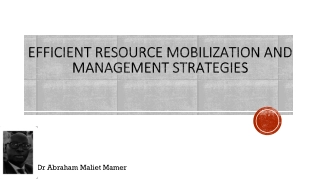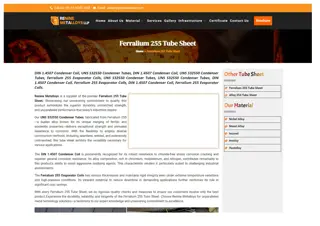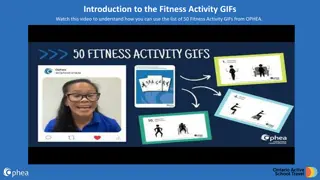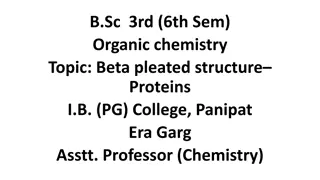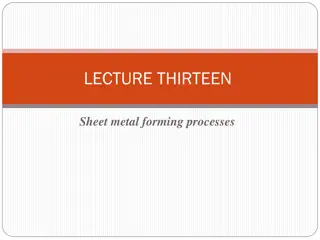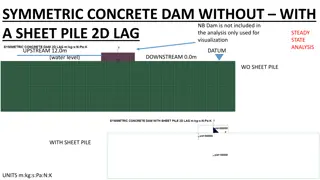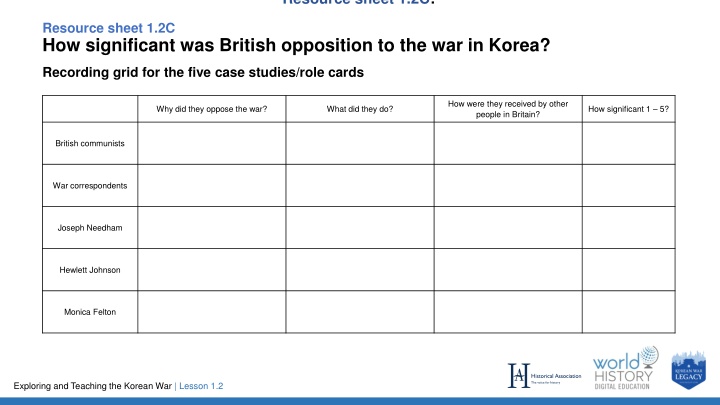
British Opposition to the Korean War: Communists vs. War Correspondents
Explore the significance of British opposition to the Korean War through the contrasting viewpoints of British Communists and War Correspondents. Learn about how British Communists faced criticism and lack of support for their anti-American stance while War Correspondents like James Cameron shed light on civilian suffering and atrocities, with mixed success in exposing the true impact of the war.
Download Presentation

Please find below an Image/Link to download the presentation.
The content on the website is provided AS IS for your information and personal use only. It may not be sold, licensed, or shared on other websites without obtaining consent from the author. If you encounter any issues during the download, it is possible that the publisher has removed the file from their server.
You are allowed to download the files provided on this website for personal or commercial use, subject to the condition that they are used lawfully. All files are the property of their respective owners.
The content on the website is provided AS IS for your information and personal use only. It may not be sold, licensed, or shared on other websites without obtaining consent from the author.
E N D
Presentation Transcript
Resource sheet 1.2C: Resource sheet 1.2C How significant was British opposition to the war in Korea? Recording grid for the five case studies/role cards How were they received by other people in Britain? Why did they oppose the war? What did they do? How significant 1 5? British communists War correspondents Joseph Needham Hewlett Johnson Monica Felton Exploring and Teaching the Korean War | Lesson 1.2
ROLE CARD Resource sheet 1.2C Opposition case study: Communists RESPONSE Most British newspapers and many British people were highly anti-communist. This meant that any ideas of British communists were usually heavily criticised, including their view on Korea, even though most British people were ambivalent about the war. Therefore they failed to gain much sympathy or support. Some employees in London firms were sacked for circulating communist peace petitions. There was even one story that a 17-year-old Scout had been dismissed from the Boy Scouts as his communist tendencies went against his oath to the King! Nevertheless, the anti-American feeling of the CPGB was shared by others. A mass survey in London in 1951 found that people were talking about the USA trying to control the world . The Communist Party of Great Britain (CPGB) was led by Harry Pollitt. They were strongly anti-American. They argued that the war was being fought purely to make the USA money and to spread their control over the world. Pollitt wrote that British lads were being forced to shoot down other lads in Korea. The CPGB held 7,000 campaign meetings in 1952 alone and also used their newspaper, The Daily Worker, to get their message across. They wrote lots about the impact of the war on Korean civilians. They also (falsely) accused the USA of using smallpox germs in Korea. Their journalist, Alan Winterton, visited Korea in July 1950 and wrote a leaflet called I Saw the Truth in Korea , claiming that the US bombing in Korea was worse than the Nazi bombing of Coventry. For photo evidence see https://flashbak.com/wp- content/uploads/2015/05/2660350.jpg Exploring and Teaching the Korean War | Lesson 1.2
ROLE CARD Resource sheet 1.2C Opposition case study: War correspondents The Daily Telegraph s war correspondent documented the impact of war on civilians and drew parallels with Nazi concentration camps. The BBC s correspondent, Rene Cutforth, accompanied UN forces in the winter retreat down the Peninsula in 1950 51 and wrote about the plight of Korean refugees on the road. He also criticised the first US use of napalm. James Cameron and Bert Hardy British journalist James Cameron and photographer Bert Hardy covered the war for Picture Post. Although Cameron did not disagree with the war on principle, on 16 September 1950, he described the fighting as 'filthy . He wrote about the suffering of the local population. He was sacked for trying to publish shocking pictures of POW (prisoner of war) treatment and atrocities committed by South Korean forces. After the war, Cameron was a founding member of the Campaign for Nuclear Disarmament (CND). You can see a picture of them here RESPONSE War correspondents had mixed success in exposing the civilian casualties of the war. Cameron s coverage was well known. Picture Post was one of the few publications to cover civilian suffering in any great detail. However, in May 1951, the Labour MP Frank Allaun wrote that there were few people willing to spare a thought for the thousands killed or horribly wounded in a single day s fighting in Korea last week . Exploring and Teaching the Korean War | Lesson 1.2
ROLE CARD Resource sheet 1.2C Opposition case study: Joseph Needham RESPONSE Other scientists were critical of the evidence and Needham had limited impact, although it did bring Britain s attention back to Korea briefly. A meeting of the Trades Union Congress in Margate called for banning of chemical and germ warfare. The British Peace Committee also organised lectures on the dangers of germ warfare across the country. The People s Republic of China claimed that the United States had started a campaign of bacteriological warfare. Supposedly, the USA had dropped diseased rodents and insects over China and North Korea for two months from January 1952. These allegations turned out to be false propaganda by the PRC. Nevertheless, they were supported by Joseph Needham, a leading scientist. Needham was a well-known biochemist who visited China and North Korea in the summer of 1952. While there, he spoke to two captured American airmen who claimed to have been involved in dropping bacteriological weapons on North Korea. When he returned to Britain, Needham went on a lecture tour and wrote to The Times, urging other scientists to study the claims. Exploring and Teaching the Korean War | Lesson 1.2
ROLE CARD Resource sheet 1.2C Opposition case study: Hewlett Johnson Hewlett Johnson Johnson was known as the Red Dean of Canterbury because of his support for the USSR. Johnson had visited the USSR in the 1930s. He saw socialism and Christianity as allies. Johnson visited China in 1952 and became utterly convinced by Chinese claims that the USA was using germ warfare against their troops. (These allegations turned out to be false propaganda by China.) He brought back a 35ft-long petition from Chinese pastors and churches against germ warfare. RESPONSE The British press criticised Johnson for his trip and said that it was undermining British troops in Korea. In response, Johnson wrote a pamphlet called I Appeal , where he attempted to defend himself and again criticised the alleged use of germ warfare. Johnson sent his pamphlet to all his fellow peers in the House of Lords but received little support from them. One accused him of being a communist and another asked whether legal action against Johnson was possible! However, Johnson did receive some support. For example, the socialist historian EP Thompson wrote to him in support, speaking out against the way the press had attacked him. Exploring and Teaching the Korean War | Lesson 1.2
ROLE CARD Resource sheet 1.2C Opposition case study: Monica Felton Monica Felton Felton was a town planner helping to design and build Stevenage, one of the new towns built in post-war Britain. She was a government employee and also a member of the Labour Party. She went to Korea in summer 1951 on a 'fact-finding' mission arranged by an international women s organisation. She returned to Britain claiming that she had seen refugees and orphans, the destruction of temples and museums, mass graves and evidence of widespread brutality by British and allied soldiers. The organisation s report urged people to call for immediate withdrawal of British troops from Korea. RESPONSE There was a public outcry. Felton was attacked in the press. She was sacked from her job, given that she was a government employee and had missed an important meeting. Sections of the country called for her to be placed on trial for treason. (She wasn t!) Felton held a series of meetings in London in June 1951, which attracted hundreds of people. The Press Association reported that women openly wept at her descriptions of violence against Koreans. Some individuals did protest over her sacking, and 80 Labour MPs went to hear her speak in 1951. Exploring and Teaching the Korean War | Lesson 1.2
Resource sheet 1.2C How significant was British opposition to the Korean war? Plenary Activity Write down up to three pieces of evidence to support your view: Taking into account all five individuals/groups, which words would you use to describe British opposition to the Korean War? Circle them below or add your own: 1. _____________________________ _____________________________ ______________ half-hearted intense isolated widespread 2. _____________________________ _____________________________ ______________ hostile mild concentrated committed ignored alarming limited unorganised organised unimportant 3. _____________________________ _____________________________ ______________ successful loud influential ineffective Exploring and Teaching the Korean War | Lesson 1.2


